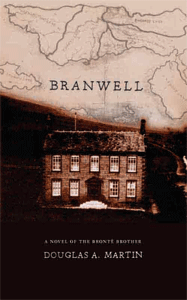Branwell.
There are two types of girls in the Western world: Jane Eyre girls and Elizabeth Bennett girls. Although most love both of the 19th-century's most famous fictional heroines, the majority will confess, if pressed, that deep down their loyalties lie with either one or the other.
Although I, too, fell in love with Colin Firth's portrayal of Mr. Darcy and will accept no substitutes, when it comes right down to it, I'm a Jane Eyre girl all the way.
I first read Charlotte Brontë's classic gothic novel when I was ten, the same age as the protagonist was when she was abused by her wicked aunt and banished to Lowood, the charity orphanage. Jane's fierce, uncompromising passion struck a deep chord in my middle-class suburban heart, and Jane's defiant statement when being dragged off to the haunted red room, "I resisted all the way," still gives me a vicarious thrill.
When I was given the opportunity to read Douglas A. Martin's Branwell, the fictionalized biography of Charlotte Brontë's underachieving brother, I tore into it, hoping desperately for glimpses of his genius older sister and revelling in each mention of her work on Jane Eyre.
My tendency to crane my neck past Branwell in order to long after Charlotte was, according to the novel, exactly what was wrong with Branwell to begin with.
As Martin writes, a 19th-century boy is "a medal his parents must forever try to polish." If true, the Branwell became irrevocably tarnished, and made even more so by the unheralded success of his three gifted sisters. As the only son of five children, young Branwell was as spoiled and privileged above his sisters as he was burdened with the pressure of the expectations weighing on his shoulders.
Branwell's clergyman father, Patrick Brontë, guarded his prized son to an extreme, homeschooling him from Haworth, their remote home, and refusing to allow him to socialize with other, less worthy boys. Branwell's childhood, then, was spent almost exclusively in the company of his sisters, the late Maria, with whom he had the strongest bond, Charlotte, Emily, and Anne, who all fully expected him to be the brightest star in the family sky.
To paraphrase Sam Lipsyte, things did not pan out.
Branwell bumped around from career to career, spending the money his sisters, father, and aunt sacrificed for him, and never able to display any of the laser-like passion that so focused his sisters, melted under the disappointed gaze of his family. He muffled up their collective disapproval with opium and swallowed his self-loathing with layer upon layer of alcohol, fading into death at the age of 31, ruined and dissolute.
Those looking for the keen determination and righteous anger of Charlotte won't find it in Branwell. The bare bones of Branwell's life, gleaned from scraps of writing and newspaper articles aren't brought into focus. Instead, the entire novel adopts the passive tone of Brontë himself, a man so personally regressive he painted himself out of the family portrait. The permeating voice is listless and dispassionate, as if Branwell himself is telling the story from the bottom of a fingerful of laudanaum. There is no dialogue between characters, and even the questions are all phrased as statements, as if the narrator did not care whether he was heard or not.
When there isn't much happening between plot points, this disaffectation grows a bit tiresome; however, when a big fat sex scandal plops itself in the center of the book, the reader becomes much more drawn in, as the actual events of the drama are ferreted out.
In the end, Branwell puts a very human face on the least successful of the Brontës, albeit a face from far in the distance, and only sharply draws into focus the exact reason why Charlotte Brontë rolled up her worksleeves and got going on her masterpiece.
_______________________
Branwell
by Douglas A. Martin
Soft Skull Press
published 2005
Softcover
232 pages
ISBN - 1-933368-00-4
Sunday, April 23, 2006
<< Home
